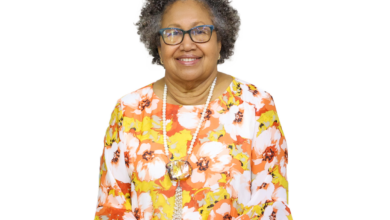The second edition of the School of Digital Transformation and Innovation in the Caribbean (SoDTIC) successfully convened from 16-20 June 2025 at the Trinidad Hilton and Conference Centre in Port-of-Spain, Trinidad and Tobago. This premier capacity-building initiative brought together policymakers, regulators, academics, technical experts, and development partners from across Latin America and the Caribbean to engage in high-level dialogue and practical training on advancing digital transformation and innovation in the region.
Co-organised by the United Nations Economic Commission for Latin America and the Caribbean (UN ECLAC), the Development Bank of Latin America and the Caribbean (CAF), the Caribbean Telecommunications Union (CTU), CETIC.br/NIC.br, The University of the West Indies (UWI), and the Internet Technical Community – including LACNIC, ICANN, the Internet Society, LACTLD, LAC-IX, ARIN and RedCLARA – the 2025 School focused on critical themes such as AI governance, meaningful connectivity, infrastructure resilience, policy frameworks, and financing for digital transformation.
The Opening Ceremony on 16 June featured interventions from regional leaders, each underscoring the importance of collaboration, innovation, and strategic policymaking in navigating the Caribbean’s digital future.
Mr. Demetris Herakleous, Associate Economic Affairs Officer at UN ECLAC, described the School as more than a training programme.
“It is a collective space for learning, exchange, and co-creation.” He highlighted that the Caribbean’s digital transformation must be people-centred, inclusive, and tailored to regional realities. “Digital tools can expand the rights and opportunities of all people in the region,” he affirmed, urging participants to engage fully in the week’s sessions and bring forward their lived experiences.
Mr. Bernardo Requena, CAF Director Representative for Trinidad and Tobago, called for “a bold rethinking of how the State delivers value in the digital age.” He cited inequality in connectivity, vulnerability to natural disasters, and regulatory fragmentation as challenges, but stressed that “the digital future we envision will not emerge by chance. It must be built together.”
Ms. Ana Laura Martínez, Coordinator at CETIC.br, celebrated the Caribbean’s growing engagement with digital transformation. “Apps from countries across the region have nearly doubled since last year,” she noted. She championed the importance of evidence-based policymaking and robust ICT statistics to shape inclusive digital policies, reminding attendees that “digital transformation is not only a technological process, but a socio-technical one.”
Dr. Kim Mallalieu, Chair of UWI St. Augustine Campus ICT Steering Committee, called on participants to “contemplate the possibilities for uniquely Caribbean solutions to our unique challenges.” She emphasised that digital transformation is a strategic enabler for operational efficiency and regional resilience and encouraged active engagement throughout the week to harness the Caribbean’s “prime real estate for digital innovation.”
Mr. Cory Belfon, Permanent Secretary of the Ministry of Public Administration and Artificial Intelligence, delivered an address on behalf of Minister Dominic Smith. He underscored the School’s significance as a forum for “capacity building, knowledge exchange, challenging perspectives, and pursuing collaborative solutions.” He highlighted artificial intelligence and regional cooperation as critical focus areas, noting that “the Caribbean’s digital transformation is not something to be outsourced or left to chance.”
The five-day programme featured a rigorous agenda of lectures, workshops, panel discussions, and case studies. Thematic sessions explored a range of topics, including the role and future of the Internet; ethical and regulatory frameworks for AI; regional cybersecurity; and digital public infrastructure and legal enablers, such as data protection and e-signatures.
Participants from ministries of digital transformation, planning, finance, trade, and legal affairs across the region, along with regulators, chambers of commerce, and international organisations, shared insights and best practices, contributing to a rich peer-learning environment.
During the closing ceremony on 20 June, Dr. Mallalieu reaffirmed UWI’s long-term commitment to capacity-building, research, and regional development, highlighting the university’s legacy of producing thought leaders in telecommunications and digital policy. She acknowledged the tireless efforts of the organising partners and thanked participants for their dynamic contributions throughout the programme.
Certificates of participation were awarded to individuals who completed at least two-thirds of the sessions.
The 2025 edition of SoDTIC reaffirmed the region’s dedication to shaping a digital transformation agenda that is equitable, resilient, and tailored to Caribbean realities. As echoed throughout the event, the digital future must be one that is built collaboratively; informed by evidence; and rooted in regional cooperation.






